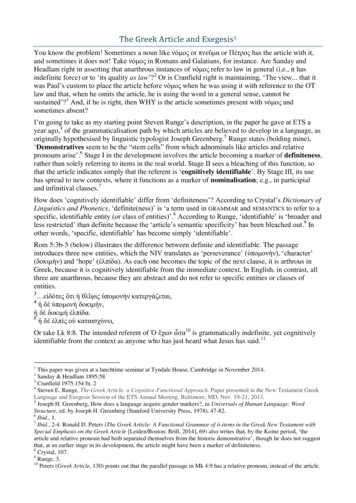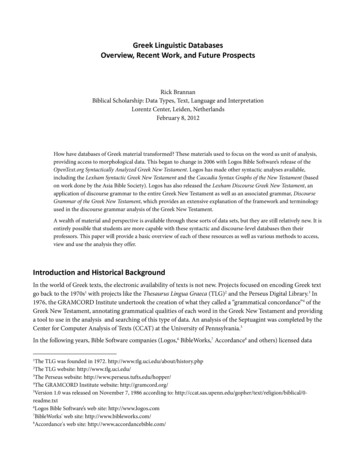
Transcription
Simplified GreekGrammarJustin T. Alfred
Table of ContentsIntroductionChapter Onei-iv1-10Greek AlphabetCursive Writing – Greek LettersWord Formation & PronunciationCursive Writing – Greek Words1-23-45-99-10Chapter Two11-46Greek Nouns & AdjectivesGreek Case SystemInterpretation of 5-3738-4142-46Chapter Three47-60Greek VerbsPresent TenseImperfect TenseFuture TenseAorist TensePerfect TensePluperfect Tense4748-5051-525354-5657-5960Chapter Four61-66Greek VoiceGreek Mood61-6262-66
Chapter Five67-70The Greek ParticipleThe Greek Infinitive67-7070Chapter Six71-72Practical Application – I Corinthians 1:2Practical Application – II Corinthians 5:8AppendixGreek Alphabet & DiphthongsGreek CasesGreek VerbsGreek VoiceGreek MoodGreek ParticiplesGreek Infinitives717273-807373-7677-7879798080
Simplified Greek GrammarIntroductionMany years ago while teaching Hebrew and Greek for Fuller Theological Seminary’sExtension School in Colorado Springs, CO, I realized that the vast majority of pastorsand lay people who were taking Beginning Hebrew & Greek were really needingsomething that wasn’t as intense and all encompassing as the full course in grammar foreach of these two languages. Thus, I began praying about writing a grammar for eachlanguage that would provide the student with the necessary tools to accurately andadequately understand and teach to others the truth being expressed through theselanguages, while at the same time developing a course curriculum that was realistic andreasonable as far as the time necessary for the course itself, as well as something thatcould be grasped and used in a relatively short period of time. The result of that prayerhas been the development of what I call Simplified Hebrew and Simplified Greek. I havealso developed a course called Advanced Simplified Hebrew & Greek, which takes thosestudents who have either had my Simplified Hebrew and Simplified Greek grammars, orwho have taken the full grammar course at some earlier time and want to refresh theirskills in either or both.In essence, therefore, the aim of this Simplified Greek grammar is the following: (1)To enable the student to be able to read and pronounce the Greek letters and diphthongs,and then to be able to pronounce the Greek words in combination with the various lettersand diphthongs. (2) To be able to find in an Interlinear Greek-English New Testamentthe Greek word or words one wants to examine and analyze. (3) To be able to go andfind the Greek word or words in the Analytical Greek Lexicon and understand what theparsing of those Greek verbs or nouns means. (4) To be able to go to the Greek-EnglishLexicon of the New Testament and find the expanded meaning of the word. (5) Andfinally, to be able to put all of the above together in a simple and cohesive manner andgive a clear and basic understanding to listeners of what the Greek is presenting in aparticular passage. This course is twenty-four hours long, and at the end of it, if a studenthas applied himself or herself, they will be able to do the above.
My prayer for you, the student, is that God will use this course in a mighty way inyour life, and that He will be honored and glorified in your understanding of the Greek asyour share and minister to others the truths the Holy Spirit teaches you, and in turn, thosewho receive His truth will become more conformed to the image of Jesus Christ and walkin His freedom (John 8:31-32).Approach to this StudyLets say you are reading along in your English Bible in I John 1:7: “but if we walk inthe light as He Himself is in the light, we have fellowship with one another, and the bloodof Jesus His Son cleanses us from all sin.” As you read this passage, you are interested inthe word “cleanses,” and you want to know what this word means and is expressing inthe Greek. Your next step will be to go to the Interlinear Greek-English New Testament,and there you will find the Greek words written on the top line, and the Englishtranslations written just beneath them. Therefore, the verse will appear in the followingformat:evan.de.evntw/ fwti.peripatw/menw jauvto,jevstinIfbutinthelightwe walkasHeisavllh,lwnkai.to.one anotherandtheevntw/ fwti,(koinwni,ane;comenmetVinthelight,fellowshipwe havewithai-mabloodVIhsou/tou/ ui ou/of Jesus theauvtou/ kaqari,zeison of Himcleansesh ma/javpo.usfrompa,shjalla marti,ajÅsin.First of all, after you have taken this course, you will be able to pronounce all of theGreek words above. Your next step will be to find the English word “cleanses” in theinterlinear translation below the Greek words. Once you have done that, you will thenlook just above the English word “cleanses” to find the Greek word from whence“cleanses” comes. When you do that, you discover that the Greek word is kaqari,zeiii
(katharidzei). Your next step will then be to go to the Analytical Greek Lexicon to findthe very form of this Greek word. When you do, you will find the following:kaqari,zw (2511)kaqari,zei,3pers.sg.pres.act.indic. . . . . . . . . . . . . . . . . . . id.Once again, after you have taken this course, you will know what all of the above meansand how that affects the translation. For example, you will know that “3 pers.” isreferring to the person performing the action, that is, I (1st person), you (2nd person), orhe, she it (3rd person). In this instance, it is he, she or it performing the action of“cleansing,” and in our passage, the “blood of Jesus” is that which is performing the“cleansing.” The “sg.” indicates it is singular, not plural. That is, it is not “bloods,” butJesus’ “blood” that is alone performing the cleansing. The “pres.” indicates it is thepresent tense in Greek, which implies continuous action of the verb being used. The“act.” indicates it is the active voice, which means the “blood” itself is performing thisaction. And finally, the “indic.” means it is the indicative mood, which means this issomething that is actually occurring now, for every believer in Christ. Thus, all of theabove together means that the blood of Jesus is in actual fact continually cleansing thoseof us who are believers in Jesus Christ all the time, even when we may not be consciouslyaware of our sin. This cleansing, therefore, is based on the righteousness of God imputedto us through receiving Christ, not on any supposed righteousness we might think wehave accrued through our own efforts at being ‘good’.When you look to the far right, you notice the letters “id.,” and this is an abbreviationfor the Latin word idem, which means ‘the same as the above’. It is identical to our dittomarks when we are listing items successively beneath each other and the same word isbeing used consistently. For example:I have three dogs.I have “cats.I have “ homes.I have “cars.The “id.” is used in the same way as the ditto marks “ are used in the above example.Thus, you follow the trail upward from the “id.” And you will eventually come to the rootiii
word, which in this case is kaqari,zw. You will notice out beside kaqari,zw is (2511),and this is indicating where you will find this word listed in the Greek-English Lexicon,which is where you will go next in order to find the expanded meaning of this word. Inthe Greek-English Lexicon beside 2511, which is written in the column beside the Greekword, you will find the expanded meaning of kaqari,zw. In that meaning, for example,you will discover that it means to free from the defilement of sin and from faults, to freefrom the guilt of sin, among several meanings and applications. Therefore, when you addthis expanded meaning with the above information, you realize that this passage is sayingthat as a child of God, the “blood of Jesus is actually and continually freeing me from thedefilement, faults and guilt of sin” as I walk in the salvation I have through Jesus. Whatan incredible blessing that is to know!I pray that the Lord will use this Simplified Greek Grammar in your life toaccomplishment His plan and purpose in and through you for Christ to be made known toa lost and dying world that doesn’t have a clue where true life is found. This is all aboutJesus, not simply you learning about Greek. Therefore, the knowledge of Greek willhave little impact in your life apart from you first of all surrendering daily to the Lordshipof Jesus, and secondly, growing in faith and trust in Him for all things in your life. Whenthese two guiding principles are priorities in your life, then God will work in and throughyour knowledge of Greek to cause you to be blessed in ways you can’t even imagine, andin turn, He will also cause you to be a blessing to others as He communicates in andthrough you the life of Jesus, so that others, like yourself, may truly be set free in Him(John 8:31-32).iv
Chapter OneThe Greek AlphabetThe Greek alphabet has some letters that are identical to English letters. On the otherhand, most of the letters are quite different, and the sounds of some of these letters arealso quite different from English. However, with practice, you can easily master thesedifferences. The following format begins in the far left column with the Greek capitalletters. These are used quite rarely, so we won’t spend any time in memorizing them.However, you do need to familiarize yourself with what they look like so when you docome to them in the text, you will know how to pronounce them. The second columncontains the Greek small letters, and it is these letters you will need to memorize. Thethird column is the English transliteration of the Greek letter. Transliteration means youare writing the English letter or combination of letters that represent a particular Greekletter. The fourth and final column is the correct pronunciation of these Greek lettersaccording to English pronunciation. You will notice that I have underlined the letter inthe English word that represents the sound the Greek letter actually makes when youpronounce it.Learning the Greek alphabet is an absolute must if you intend to go any further withthis course. If you do not learn and memorize the alphabet, then you will not be able tograsp anything else we do in this course, and you will be completely lost. Therefore, takethe necessary time to learn and memorize the alphabet in order to profit from this course.Please remember as well that you are doing this unto the Lord, and as you do that “fromthe Lord you will receive the reward of the inheritance” (Colossians 3:24).
Greek Letters:CapitalΑSmallαΒΓ νξοπρ RhoSigmaTauUpsilonPhiChiPsiOmegaEnglish EquivalentLong: a as in FatherShort: a as in batb as in ballg as in gamed as in doge as in metz as in zoo at the beginningof a worddz as in adz is usually in themiddle of a wordē as in obeyth as in withLong: i as in ChristinaShort: i as bitk as in keepl as in lookm as in muchn as in notx as in flexo as in objectp as in playr as in reals as in seet as in takeu as in clueph as in phonech as in chaosps as in wrapsō as in own* There are two forms for the Greek letter Sigma: the σ is the form used at thebeginning or middle of a word (e.g., sw/ma sōma body; evkklhsi,a ekklēsia church); the j is the form used as the last letter of a word (e.g., lo,goj logos word).2
Cursive Writing – Greek LettersWe will now begin to practice writing these letters cursively. I will write the letter first,and then you practice until your letter looks like mine.Alpha –Beta –Gamma –Delta –Epsilon* -Zeta –Eta* -Theta –Iota –Kappa –Lambda –Mu -Nu –Xi –Omicron* -Pi -Rho –3
Sigma –Tau –Upsilon –Phi –Chi –Psi –Omega* -* When transliterating these letters, because epsilon and eta and omicron and omega arewritten the same in English (e.g., epsilon and eta are both "e," and omicron and omegaare both "o"), you will distinguish between them in the following manner: epsilon-e-willbe "e," and eta-h-will be "ē" with the bar over it; omicron-o-will be "o," and omega-wwill be "ō" with the bar over it (e.g., h;negka ēnegka; avgkw/no,j agkōnos).4
Word Formation &Correct PronunciationWe will now begin to practice putting the letters together to form words. This will bean exciting step as you actually begin to read and write Greek words. We will begin withthe top of the alphabet and work downward; i.e., we will begin with Greek words whosefirst is the letter a (alpha), then we will go to words that begin with the letter b (beta), etc.Beside each Greek word I will write the English meaning in parenthesis.After I write the Greek word, I will then break it down according to syllables if it hasmore than one. I will then transliterate each Greek syllable into English, and you willpractice pronunciation, one syllable at a time. And finally, you will pronounce the wordin its entirety.Following this you will practice writing some of the words in cursive Greek. This willbe an excellent means for you to familiarize yourself with using the cursive script in avery practical way, as well as learning to recognize certain words and know theirmeaning.Another important aspect about Greek pronunciation is the matter of accent andbreathing marks. An accent mark is placed on a Greek word for emphasis. For example,in the word avga,ph (agapē), we have two marks above the letters: the first is a smoothbreathing mark over the first av and it receives no emphasis at all. However, the secondmark is over the second a,, and this mark is called an acute accent. This ́ mark indicatesthat you stress this syllable in pronunciation.Breathing MarksThere are two breathing marks used in Greek, and they are placed either over the firstvowel, which begins a word, or over the second of two vowels, which begin a word (thislatter is called a diphthong, and I will explain that later). The one exception to this rule iswith the consonant r. Whenever r begins a word it has a rough breathing mark over it,and a vowel will always proceed it (e.g., r h/ma, - hrēma).1. Smooth breathing mark - The smooth breathing mark is the equivalent of an Englishapostrophe v , and it carries no sound with it. In the word, avga,ph, the v is a smooth5
breathing mark, and you simply pronounce the word, agapē, with the stress beingon the second syllable.2. Rough breathing mark - The rough breathing mark is a backwards apostrophe andit adds an "h" sound to the letter it is over. For example, the Greek word ispronounced ēmera. However, when the rough breathing mark is added over the h then the word appears as h me,ra, and it is pronounced as hēmera, with the stressbeing on the second syllable.Accent MarksThere are three accent marks which are used to indicate stress in pronunciation:1. The acute accent mark is a line from upper right to lower left , (e.g., avga,ph agapē).2. The grave accent mark is from upper left to lower right . (karpo.j - karpos).3. The circumflex accent is a wavy or curved line over a letter ó (dou/loj - doulos).DiphthongsA diphthong is a combination of two vowels that make one sound. For example, inEnglish, the two vowels “ai” in the word aisle form a diphthong so that all that is heard isthe letter “i” as in island. The same is true in Greek where you have seven combinationsof two vowels that make seven different singular sounds:1. αι is pronounced like ai in aisle (dai,mwn - daimōn).2. ει is pronounced like ei in height (gei,twn - geitōn).3. οι is pronounced like oi in boil (koino,j - koinos).4. αυ is pronounced like au in kraut (qauma,zw - thaumadzō).5. ευ is pronounced like eu in leukemia (zeu/goj – zeugos [when the ευ diphthong is inthe middle of a word, it is pronounced as “eu” in zeugos, however, when it is at thebeginning of a word, as in euvdi,a, then it is pronounced as yeudia, with a “y” soundattached to it. However, in actual transliteration, you don’t write the “y,” but I amwriting it for you to show you the correct pronunciation])6. ου is pronounced like ou in roulette (dou/loj - doulos).6
7. υι is pronounced like we ui o,j - wheos [in actual transliteration, the wh would bereplaced by ui; however, for pronunciation purposes I have given the above]).Forming WordsThe next step will be to put the Greek letters, breathing marks, accent marks anddiphthongs together in order to make words and properly pronounce them. The followinglist has been developed along this line. The Greek word will be written in the leftcolumn, along with its definition in parenthesis. Then, I will separate the word byindividual syllables (i.e., like “telephone”: te-le-phone) and accompany each Greeksyllable with its English transliteration. The final step will be to have the full Greek wordwritten again, but this time followed by its English, transliterated form.avgaqo,j (good) ἀ a; γα ga; qo,j thos; avgaqo,j agathosavga,ph (love)avdelfo,jἀ a;γά ga; πη pē; avga,ph agapē(brother) ἀ a; δελ del; fo,j phos; avdelfo,j adelphosbaqu,j (deep) βα ba; qu,j thus; baqu,j bathusgnῶ/sij (knowledge) γνῶ gnœ; sij sis; gnw/sij gnœsisdiakoni,a (ministry) δι di; α a; κο ko; νί ni; α a; diakoni,a diakoniado,xa (glory) δό do; xa xa; do,xa doxadoῦ/loj (slave) δοῦ dou; loj los; dou/loj doulosevgw, (I) ἐ e; γώ gō; evgw, egōevklekto,j (chosen) ἐκ ek; λεκ lek; to,j tos; evklekto,j eklektosevntolh, (commandment) ἐν en; το to; λή lē; evntolh, entolē7
euvqe,wj (immediately) εὐ eu (as in you); θέ the; wj ōs; euvqe,wj eutheōszwh,(life) ζω zō; ή ē; ζωη zōēh donh. (pleasure) hēdonēQeo,j hē (rough breathing mark); δο do; νὴ nē; h donh.(God) θε the; o,j os; Qeo,j theosἸησοῦ/j (Jesus) VI I ; η ē; soῦ/j sous; VIhsou/j Iēsouskaqaro,j(pure) κα ka; θα tha; ro,j ros; kaqaro,j katharosku,rioj (Lord) κύ ku; ρι ri; oj os; ku,rioj kurioslao,j (people) λα la; o,j os; lao,j laosmikro,j (little) µικ mik; ro,j ros; mikro,j mikrosnekro,j (dead) νεκ nek; ro,j ros; nekro,j nekrosxe,noj (strange) xe, xe; noj nos; xe,noj xenosoi koj (house) oi oi; koj kos; oi koj oikospra/gma (deed) pra/g prag; µα ma; pra/gma pragmar h/ma (word) r h/ hrē (rough breathing mark); µα ma; r h/ma hrēmasch/ma (likeness) sch/ schē; µα ma; sch/ma schēmatu,poj (pattern) tu, tu; poj pos; tu,poj tuposu perli,an (special) u hu; περ per; li, li; an an; u perli,an huperlianfo,boj (fear) fo, pho; boj bos; fo,boj phobosca,rij (grace) ca, cha;rij ris; ca,rij charis8
yeudh,j (false) ψευ pseu; dh,j dēs; yeudh,j pseudēsw[ra (time) w[ hō (rough breathing mark); ρα ra; w[ra hœraCursive Writing – Greek WordsI would like for you to write the Greek word in Greek, cursive script, as well astransliterate it into English. I will do the first two for you, and then you will do theremainder:avgaqo,j (good)gnw/sij (knowledge)evklekto,j (chosen)Qeo,j(God)kaqaro,j(clean)mikro,j (small)oi koj (house)r h/ma (word)u perli,an (special)yeudh,j (false)avtimi,a (disgrace)du,namij (power)kako,j (evil)profh,thj (prophet)maka,rioj (blessed)9
qa,natoj (death)te,leioj (complete)10
Chapter TwoGreek Nouns & AdjectivesThe Greek language has its nouns and adjectives divided into three divisions calleddeclensions. Greek also has masculine, feminine, and neuter nouns and adjectives. Theseare called genders, and they are recognized by their different endings. For example, thenoun avga,ph (agapē) is a feminine noun of the first declension because it ends with η.Other feminine nouns end with an α, such as a marti,a (hamartia). Thus, the firstdeclension is primarily comprised of feminine nouns, but there are also a few masculinenouns in this declension as well whose endings are η and α .The second declension is the most dominant declension in the Greek New Testament,and it is made up of masculine and neuter nouns. The masculine nouns of this declensionend with oj, and the neuter nouns end with on. The noun lo,goj (logos) is a masculinenoun of the second declension, while dw/ron (dōron) is a neuter noun of the seconddeclension.The third declension contains all three genders, but due to the variety of stem changes,the forms are quite different. For instance, aivw,n (aiōn), path.r (patēr), and avrciereu.j(archiereus) are all masculine nouns of the third declension, but all three have differentstem endings. Likewise, nu,x (nux), ca,rij (charis), and mh,thr (mētēr) are also allfeminine nouns of the third declension, but they too have different stem endings. Andlastly, ba,qoj (bathos), ai-ma (haima), and u[dwr (hudōr) are all neuter nouns of the thirddeclension with different stems.However, for our purposes, the most important aspect of Greek nouns and adjectivesis the various cases that affect the interpretation of the text. Thus, even though theendings may vary in the three declensions, the meaning and application of the differentcases will uniformly be the same. Therefore, we will only use the paradigm of the seconddeclension masculine noun to learn the different cases.The Greek Case SystemThe idea of a case is foreign to English, but it is an essential part of Greek grammar, aswell as German and Latin. For instance, if I were to say in English, "God loves me," and11
"I love God," I would spell the word "God" the same way in both instances. In the firstexample, "God" is the subject of the verb "loves," and in the second example, "God" isthe object of the verb "love." If I were to express these same thoughts in Greek, I wouldwrite them as follows: "God loves me" qeo.j avgapa/ me (theos agapą me); "I love God" evgw. avgapw/ qeo,n (egō agapō theon). Now qeo.j (theos) and qeo,n (theon) are the exactsame word, "God," but when used as a different part of speech (e.g., subject versus objectof verb), then the ending will reflect that difference; e.g., qeo.j (theos) is the subject case,and qeo,n (theon) is the object case, but both mean "God."I once had some Jehovah's Witnesses come by my house and tell me that in John 1:1,qeo,n (theon) meant "Almighty God," while qeo.j (theos) meant "little god." My heartwent out to these poor, misguided people, but it showed me that the Witnesses eitherhave no knowledge of Greek whatsoever, or they are absolute liars, or both! Both wordsmean "God," they are simply written in different case endings.The following are the different cases and, their forms in the second declension,masculine, singular, noun paradigm, with qeo.j (theos) as the example (although the pluralform is written differently, the meaning of the cases and their application is the same;thus, we will only need to use the singular form):Greek FormCaseθε- o.j (theos)θε- ou/ (theou)nominativegenitiveθε- ou/ (theou)θε- w/ (theǭ)ablativedativeθε- w/ (theǭ)θε- w/ (theǭ)θε-o,n ve(thee)Case MeaningSubject of verbDenotes description/possessionDenotes separationDenotes focus ofinterest/indirect objectDenotes locationDenotes meansDenotes direct object ofverbdenotes addressAs you can see, there are eight different case functions in New Testament Greek, withthe genitive and ablative having the same form, and the dative, locative and instrumentalalso having the same form. Later on, when you begin to use the Analytical Greek12
Lexicon, you will discover that the ablative is not listed as a separate case with thegenitive form, and neither are the locative and instrumental listed as separate cases withthe dative form. Thus, you will make that distinction yourself; i.e., when you find a wordlisted as a genitive, you will then decide, based on how it is used in the text, whether ornot it is a genitive or ablative, and what kind (we will be looking at the variety of usageson the following pages), and the same will be true for the dative (i.e., when a word islisted as a dative, you will then decide, based on how it is used in the text, whether or notit is a dative, locative or instrumental- and what kind). Each of these cases haveimportant significance, and using qeo.j (theos) as our example, we will now look at eachof these cases in a sentence structure to see how they are used and how they are to beinterpreted.In addition, you will notice that for the dative, locative, and instrumental cases, theform is qew/ (theǭ). The little mark ̢ under the ω is called an iota subscript, and it is usedto mark all forms of the dative, locative and instrumental cases in every noun declension,and it is also used in some verb forms. Therefore, whenever you see a letter in a wordwith an iota subscript under it (e.g., w , a and h ), then the transliterated form will be ǭ, ą,and ę̄ respectively. It is also important to note that an adjective will agree with the nounit is modifying in case, number (singular or plural) and gender.As we go through the following exercises, I will underline the word in the Englishtranslation I am referring to, and in the Greek and transliterated translations, I will putrounded parentheses () around that same word in the Greek and box parentheses [] aroundthe same word in the transliteration.1. Nominative CaseGenesis 1:1: "In the beginning God created the heaven and the earth."evn avrch/ evpoi,hsen o (qeo.j) to.n ouvrano.n kai. th.n gh/n(en archę̄ epoiēsen ho [theos] ton ouranon kai tēn gēn)The nominative or subject case also indicates that the noun is producing theaction of the verb. Thus, "God" (qeo.j - theos) is the one who "created the heavenand the earth."13
2. Genitive CaseRomans 8:16: "The Spirit Himself bears witness with our spirit that we arechildren of God."auvto. to. pneu/ma summarturei/ tw/ pneu,mati h mw/n o[ti evsme.n te,kna (qeou/)/Å(auto to pneuma summarturei tǭ pneumati hēmōn hoti esmen tekna [theou])In the phrase, "children of God" (te,kna qeou/ - tekna theou), the word "God"(qeou/ -theou) is in the genitive, thus describing the kind of children, as well aswhose children we are; i.e., we are God's children.3. Ablative CaseJohn 1:6: "There came a man sent from God, whose name was John."VEge,neto a;nqrwpoj( avpestalme,noj (para. qeou/)/( o;noma auvtw/ VIwa,nnhj\(egeneto anthrōpos, apestalmenos [para theou], onoma autǭ Iōannēs)The phrase, "from God" (para. qeou/ - para theou) denotes separation in and ofitself, with the inclusion of the preposition para (para-from). However, for ourpurposes, this is an excellent example of the ablative case that denotes separation;thus, the man was sent "from God" as an act of God separating him and sendinghim apart from others.The other thing to note is that both the genitive and ablative cases have thesame form. Therefore, the only way to distinguish between the two is the contextof the sentence. That is why it is so very important to understand the context of apassage so that one can rightly interpret what is being said.4. Dative CaseLuke 2:14: "Glory to God in the highest, and on earth peace among men withwhom He is pleased."do,xa evn u yi,stoij (qew/) kai. evpi. gh/j eivrh,nh evn avnqrw,poij euvdoki,ajÅ(doxa en hupsistois [theǭ] kai epi gēs eirēnē en anthrōpois eudokias)The phrase, "to God" (qew/ - theǭ), is in the dative case as it expresses "God" asbeing the focus of interest of the nominal clause, "Glory in the highest" (anominal clause is one in which there is no verb, but only nouns - e.g., "Joy to14
Mom the homemaker"; here, there is no verb in the clause, and it would beconsidered a nominal clause).5. Locative CaseJohn 3:21: "But he who practices the truth comes to the light, that his deeds maybe manifested as having been wrought in God."o de. poiw/n th.n avlh,qeian e;rcetai pro.j to. fw/j( i[na fanerwqh/ auvtou/ ta. e;rgao[ti (evn qew/ ) evstin eivrgasme,naÅ(ho de poiōn tēn alētheian erchetai pros to phōs, hina phanerōthē autou ta ergahoti [en theǭ] estin eirgasmena)The phrase, "in God" (evn qew/ - en theǭ), is in the locative case because it isemphasizing just where these "works" have their origin - "in God." Thus, thesphere of origin is located "in God."6. Instrumental CaseMark 10:27: "Looking upon them, Jesus said, ‘With men it is impossible, but notwith God; for all things are possible with God.’"evmble,yaj auvtoi/j o VIhsou/j le,gei\ (para. avnqrw,poij) avdu,naton( avllV ouv (para.qew/ ) pa,nta ga.r dunata. (para. tw/ qew/ ).(emblepsas autois ho Iēsous legei, [Para anthrōpois] adunaton all ou [paratheō̢] , panta gar dunata [para tō̢ theǭ])In this section of Mark, Jesus had just finished conversing with the rich youngruler, and Jesus had told him that he would be able to follow Him if he soldeverything he had and gave it to the poor. Upon hearing this, the young manwalked away sorrowfully because he was quite wealthy. Jesus in turn told Hisdisciples that it would be very difficult for wealthy people to enter into theKingdom of God. His disciples then asked, "Then who can be saved?" (Mk.10:26b). Jesus responded with the above statement in verse 27.The phrases underlined are all in the instrumental, case; i.e., they describe themeans by which something can or cannot be done. Thus, men in and of15
themselves, do not have the means to turn from trusting in their riches for theirsecurity to trusting in God, but God, on the other hand, does have the means, byHis Spirit, to cause men to turn from trusting in their wealth to trusting in Him(para. qew/ ; para. tw/ qew/ - para theǭ para tǭ theǭ).7. Accusative CaseRomans 15:6: "that with one accord you may with one voice glorify the God andFather of our Lord Jesus Christ."i[na o moqumado.n evn e ni. sto,mati doxa,zhte (to.n qeo.n) kai. pate,ra tou/ kuri,ouh mw/n VIhsou/ Cristou/Å(hina homothumadon en heni stomati doxadzēte [ton theon] kai patera tou kuriouhēmōn Iēsou Christou)Here in this instance, God is the direct object of the glorification given bybelievers, and NO ONE ELSE (to.n qeo.n ton theon)!8. Vocative CaseMatthew 27:46: "And about the ninth hour Jesus cried out with
In essence, therefore, the aim of this Simplified Greek grammar is the following: (1) To enable the student to be able to read and pronounce the Greek letters and diphthongs, and then to be able to pronounce the Greek words in combination with the various letters and diphthongs. (2) To be able to find in an Interlinear Greek-English New Testament










